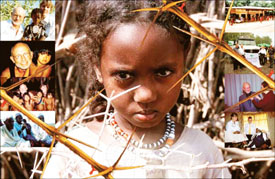|
observer |
|
|
|
|
|
OTHER LINKS |

|

|

|
|
The link between poverty and human rightsDo you generally associate poverty with human rights? Most of us don't. But poverty is very much about human rights; it is about not having the materials and resources to fulfil a person's basic needs. Yet, poverty is not really taken into account as a part of human rights. Poverty has always been characterised by factors such as discrimination, unequal access to resources, and social and cultural stigmatisation. These "factors" lead to the denial of human rights and human dignity.
'Human Rights and Poverty' is the theme of this year's Human Rights Day, which is observed by the international community, led by the United Nations, on December 10 (today). The event commemorates the day in 1948 when the Universal Declaration of Human Rights was adopted by the UN General Assembly. It was formally celebrated from 1950. The Office of the United Nations High Commissioner for Human Rights (OHCHR) plays a leading role in coordinating the annual efforts made towards the observation of the day. It helps protect and promote human rights in all corners of the world. The OHCHR is headquartered in Geneva, Switzerland and is also present in over 40 countries. The Office works to ensure the enforcement of universally recognised human rights norms (standards), through promoting both the universal ratification and implementation of human rights treaties and respect for the rule of law. It also aims to remove obstacles to the full realisation of all human rights and to prevent or stop human rights abuses. An essay competition on 'Poverty and Human Rights', organised by UN Cyberschoolbus is just one of the events being held in connection with this day. Managing mountain biodiversityMountains are a fascinating aspect of nature. They come in different shapes, sizes and even colours. The beauty of mountains has enthralled (captivated) mankind for centuries. Not only that, they play a leading role in our environment too.
This year's theme focuses on raising awareness about the need to protect sensitive mountain eco-systems in a responsible and sustainable manner so that the livelihoods of those who dwell in the mountains can be maintained in such a way that the environment is protected, and the mountains can continue to give us their natural nourishment and beauty. Managing mountain biodiversity through proper partnerships will reduce poverty, improve livelihoods, and protect mountain environments for all. The International Mountain Day was declared by the UN General Assembly in 2003. The Food and Agriculture organisation was designated as the lead agency to coordinate worldwide observances. This special day highlights the global importance of mountain eco-systems and promote attention to the unique needs of mountain communities and the challenges they face in attaining sustainable development, for a wide audience - the public, governments, inter-governmental organisations, NGOs, UN agencies, the private sector and the media. The event is being celebrated this year for the third time. KIDZ Book Buzz at British CouncilThe British Council (Colombo) will present its first ever KIDZ Book Buzz, featuring leading UK children's author and storyteller Vivian French at 4.30 p.m. tomorrow.
This event will be a one-hour programme, where French will first talk about how she became a writer, followed by an interactive session for the children to talk about how and where to get ideas for creating a story, and will end with a rough story plan and a cover design for "their book". This event is open to all kids between the ages of 6 and 11, but preference will be given to British Council's Teaching Centre and Library Young Learners who are invited to collect their 'competition coupon' from the Young Learner centre, fill it and drop it into the coupon box by tomorrow as they stand a chance to win gifts. New syllabus for English LiteratureThe publication titled 'Appreciation of English Literary Texts' which contains the poems, short stories, non-fiction and drama according to the new syllabus, has been published by the Educational Publications Department. It will be distributed to schools teaching English Literature at Grade 10 in the year 2007 along with the textbooks of other subjects. The novels are not included in this Anthology. The batch of students, who are in Grade 10 in 2007, will sit the subject 'Literary Appreciation - English' at the G.C.E. O/L Examination for the first time in 2008. Students can select one of the two novels mentioned in the syllabus. The subject has been renamed according to the curriculum revision circular for 2007, and non-examined novels and poems too are being included for enjoyment of reading and for appreciation of how language could be used. The syllabus and the texts could be downloaded for use in the classroom from the NIE website www.nie.lk under the 'Department of English'. Project to promote local foodHave you heard of nutrition centres? Known as Poshana Mandira in Sinhala, these centres are the latest project being carried out by the Indigenous Medicine Ministry. The Ministry has launched a programme to uplift the nutritional standards of the population and promote the consumption of local food items. Accordingly, nutrition centres are earmarked to be set up in all towns and other densely populated areas, with the objective of carrying out this service. The first nutrition centre under this programme was opened in the Kolonna Divisional Secretariat recently. The area of Medawachchiya and the Pallekelle Open Prison Camp are next in line to get these centres. Plans are also afoot to launch 'nutrition carts' in areas frequented by tourists, so that local food items, kola kenda and medicinal beverages can be sold to tourists besides the local populace. |

 More than one in six people in the world live on less than one dollar
a day. These are the people living in absolute poverty. In the modern
world, poverty continues to be one of the most serious human rights
challenges. By tackling the issue of poverty as a human rights
obligation, the world stands a better chance of eradicating (wiping out)
this problem.
More than one in six people in the world live on less than one dollar
a day. These are the people living in absolute poverty. In the modern
world, poverty continues to be one of the most serious human rights
challenges. By tackling the issue of poverty as a human rights
obligation, the world stands a better chance of eradicating (wiping out)
this problem.  The importance of these unique geological formations will be observed
on International Mountain Day, which falls on December 11 (tomorrow).
The theme for this year, as designated by the United Nations, is
'Managing Mountain Biodiversity for Better Lives'. Mountains are home to
many forms of life, not only flora and fauna, but to humans as well.
The importance of these unique geological formations will be observed
on International Mountain Day, which falls on December 11 (tomorrow).
The theme for this year, as designated by the United Nations, is
'Managing Mountain Biodiversity for Better Lives'. Mountains are home to
many forms of life, not only flora and fauna, but to humans as well.  French is a visiting lecturer at the University of West England, and
has been a writer in residence in many schools. She was also a regular
reviewer for The Guardian for five years. She worked in children's
theatre for ten years as both an actor and writer, and has had plays
performed in many venues in London. She is now a children's author and
story teller.
French is a visiting lecturer at the University of West England, and
has been a writer in residence in many schools. She was also a regular
reviewer for The Guardian for five years. She worked in children's
theatre for ten years as both an actor and writer, and has had plays
performed in many venues in London. She is now a children's author and
story teller. 






